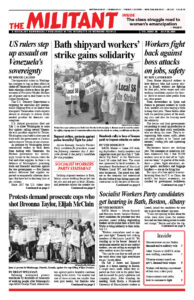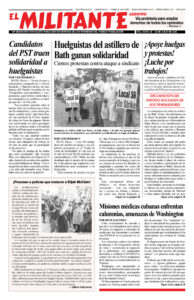After nearly nine months on the picket line in a bitter strike against Asarco copper and its international parent, Grupo Mexico, the United Steelworkers and six other unions representing 1,700 miners in Arizona and Texas ended their strike July 6. Three weeks earlier the regional office of the National Labor Relations Board in Phoenix filed a complaint against the company charging it violated federal labor laws, including failing to bargain in good faith with the unions.
The unions offered to return to work at Asarco’s five mines and processing plants. In a July 5 letter to striking miners, Steelworkers union officials argued they would be in a better position whether they got their jobs back or not. If the NLRB’s charges are adopted, they say, the company is required to give them back their jobs. If the company refuses, workers could be eligible for unemployment and for back pay from the period they were forced out on strike.
The strike began last October after Asarco bosses refused further negotiations over their “last, best and final offer.” They insisted a 10-year-long wage freeze would be extended for most workers in the new contract, health care premiums would be doubled or tripled, and the ability of the union to represent miners on the job would be curtailed. After the strike began, the company hired strikebreakers and some workers crossed the line. Asarco announced in December that it had implemented this contract.
“I hope Asarco calls us back and we can continue negotiations, but Grupo Mexico is hard to deal with,” Leonardo Segura, a long-time worker at the Asarco refinery and vice president of USW Local 5613 in Amarillo, Texas, told the Militant July 6 by phone. “We still have the food pantry going. We just got more supplies today.”
“We’re trying to force the company to take us back under the terms of the previous contract,” Lyle Murphy, president of USW Local 5252 at the Ray Mine in Kearny, Arizona, told the Militant. He has worked 16 years at the mine. “We’ll keep our strike assistance fund going.”
Asarco bosses have so far refused to comment to the press on the union officials’ decision to end the strike and whether they will offer workers their jobs back. They also have not said whether they will contest the NLRB’s charges.
Strikers maintained round-the-clock picket lines for the duration at many of Asarco’s struck mines and processing facilities. For some periods, they were taken down during COVID-19 outbreaks under pressure from state officials.
In addition to picketing, strikers organized well-attended weekly dinners, movie showings and other activities for miners, their families and supporters in the area. A number of public rallies were organized outside Asarco’s corporate headquarters and a contingent of 70 miners joined the Martin Luther King Day march and rally in Tucson, Arizona, Jan. 20.
While a couple hundred workers ended up crossing the picket lines over the monthslong fight, Murphy said that only 13 people out of 158 members in his local crossed the line.
The strikers won solidarity and contributions from longshoremen in Washington state, Walmart workers in a number of places, and other unions. “I want to thank all the people who assisted us with contributions,” Murphy said. “What you did getting the word out helped a lot. From Maine to Massachusetts and Canada we got help with donations which were greatly appreciated. The Militant helped get the word out countrywide.”

